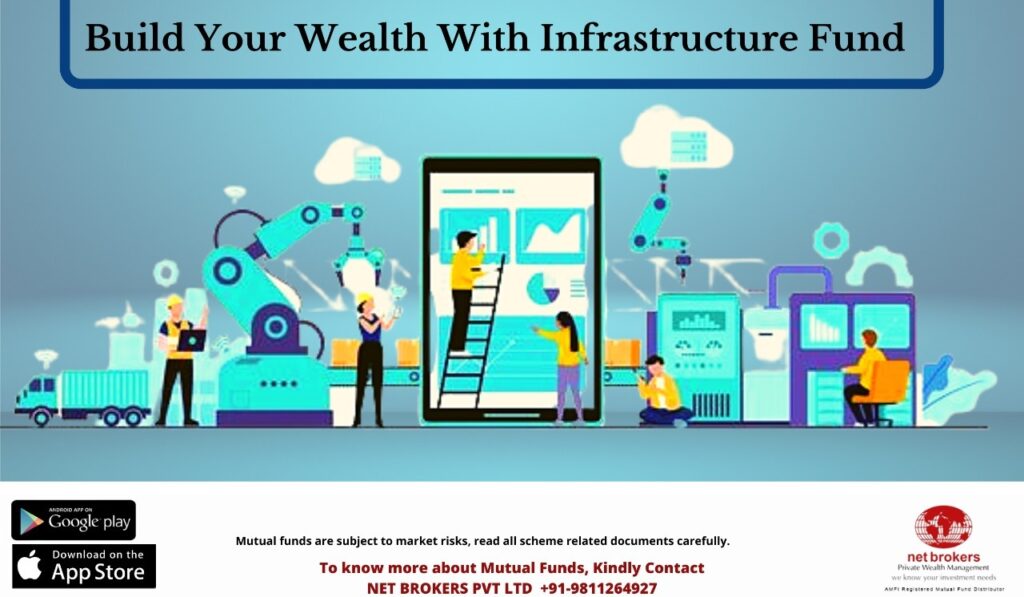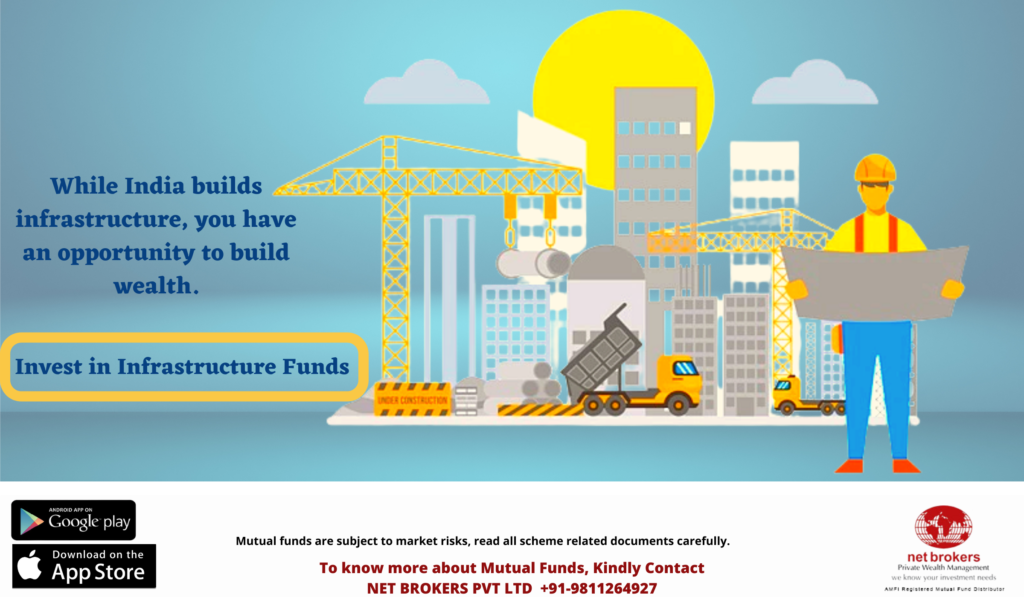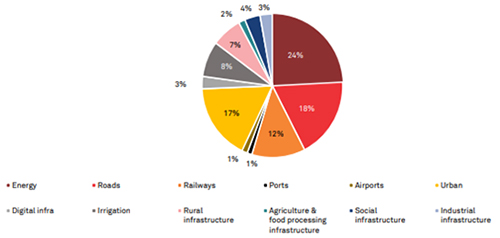Understanding Infrastructure Funds
By Akhil Chugh
Date December 19th, 2021
Infrastructure Funds are thematic funds that invest in companies which are either directly or indirectly involved in the infrastructure development in India.
Infrastructure Funds invest in public assets and services that people rely on to live, work and travel. These funds can invest in things like:
- Electric and other utility services.
- Water and sewage services.
- Waste management companies.
- Rail travel companies.
- Shipping and freight services.
- Engineering and construction.
- Oil and gas pipelines.
- Airports.
- Law enforcement and emergency services.
- Education services.
- Agriculture and farming.
- Communications services, including cell phone towers.

Infrastructure Funds focus on services and systems required for living. As a result, they can provide investors with stable and consistent returns in the long run.
Why Invest in Infrastructure Funds?
Of late, the infrastructure theme has been grabbing the spotlights–thanks to favourable valuations of the sector, the upswing in the business cycle, the announcement by the Modi-led-NDA government to develop India’s infrastructure, increasing investments, and the growth potential it offers. Let’s look at a few of the growth drivers behind the expected growth of the infrastructure sector in India:
- Recognising that good infrastructure is an enabler for economic growth, the government seems focused on improving India’s infrastructure —be it the construction of roads, bridges, dams, railway lines, airports, renewal energy, telecommunication, housing projects, etc. As per NITI Aayog, every Indian Rupee that the government spends on infrastructure development can add Rs 2.5 to Rs 3.5 to India’s GDP.

- Infrastructure sector is attracting several private investments and proving to be a potential boon for the Indian economy. The private sector is emerging as a key player across various infrastructure segments, ranging from roads and communications to power and airports.
- The National Infrastructure Pipeline (NIP) for FY 2019-25 is the first of its kind, whole-of-government exercise to provide world-class infrastructure to citizens and improve their quality of life. The total capital expenditure in infrastructure sectors in India during fiscals 2020-2025 is projected at ~Rs 111 trillion.

- To fund the enormous expenditure to improve India’s infrastructure, besides budgetary allocations and strategic sales, the government is working on an ambitious plan of asset monetization. The monetization plan worth Rs 6 trillion is likely to free up capital and would be channelized for infrastructure development.
- Recently Prime Minister Narendra Modi launched Gati Shakti, a Rs 100 trillion national master plan for multi-modal connectivity. This is a digital initiative that will get 16 ministries on one platform for coordinated planning, implementation, and monitoring of infrastructure projects. This would do away with the delays in getting project clearances, poor planning, cost overruns, cut logistics costs, provide more visibility and make available the information/data on a real-time basis, in addition to creating more employment opportunities.
- After the outbreak of the COVID-19 pandemic, which originated from China, multinational companies have now slowly begun to diversify their supply chains away from China, and are looking at India as an attractive alternative. This has once again turned the tide in favour of India’s infrastructure theme.
All of this together is expected to bode well for India’s overall economic growth in the long run. Since the Indian government has decided to pivot investments towards infrastructure development and the quantum announced is large, Infrastructure Funds would be an interesting space to invest in for wealth creation.
Who Should Invest in Infrastructure Funds?
- Investors looking to diversify their portfolio across companies operating in the infrastructure sector.
- Investors with a longer investment horizon of at least 7+ years. Infrastructure projects have two typical features viz. they have long gestation period and they are largely subjective to government controls. Therefore, you need to look at a realistic time frame of 7+ years to gain reasonable returns in the infrastructure space. That is the kind of time frame your infrastructure fund will also require to deliver returns.
Past SIP Performance of Top Infrastructure Funds
Based on our analysis and research at Net Brokers, below mentioned schemes are currently the best schemes in the Infrastructure Fund category. These funds fare well on quantitative and qualitative parameters and have the potential to deliver superior growth in the long run.

Key Takeaways from Net Brokers:
- India is one of the fastest-growing countries globally, and Infrastructure is one of the critical areas for the sustained growth of the economy. The future wealth creation process in India’s market is likely to be driven significantly by investments in infrastructure and the Infrastructure Fund aims to provide an opportunity to participate in this value creation process.
- The Indian government has decided to pivot investments towards infrastructure development and the quantum announced is large, Infrastructure Funds would be an interesting space to invest in for wealth creation.
- These funds are an excellent investment option for long-term financial goals but one should not forget that these funds are thematic-based funds and should ideally constitute only 10-15% of the total portfolio.
- Ideally, opt for a systematic investment plan (SIP) mode of investment to benefit from the rupee cost averaging in the long run.
- An Infrastructure Funds represents the investment in stock of companies providing systems, products and services that are needed to keep the economy humming along. The infrastructure sector may be a big opportunity but not all infrastructure companies will actually be profitable and generate returns. You need a fund that is quick to identify these companies and bet on them. That is where Net Brokers can help you to choose the right infrastructure fund aligned with your risk appetite and financial goals.
Net Brokers suggests 4 questions that investors should ask themselves before investing in Infrastructure Funds:
- Why is the sector going to perform?
- How long do I plan to stay invested?
- How much should I allocate to this sector without affecting my risk tolerance threshold?
- What is going to be my exit strategy?
If you need help from professional experts to answer these questions for you, contact Net Brokers today.
Download our mutual fund app & start investing in different mutual fund schemes to attain your long-term financial goals.
Happy investing!



